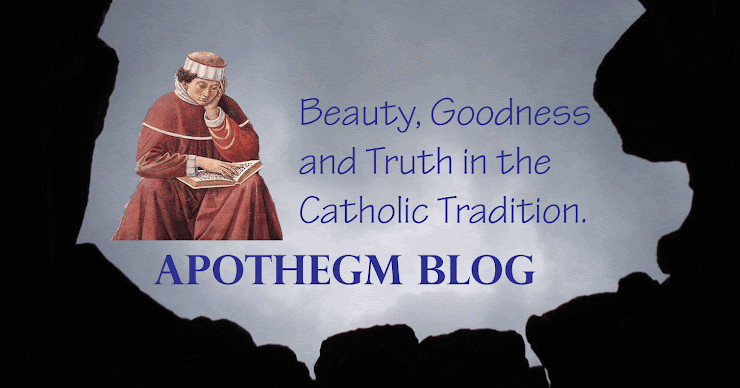
I am, and I know, and I will. Knowing and willing I exist; I know that I am and that I will; I will to be and to know (13.11.12).
Although each of these is distinct there is one inseparable unity to their life—one mind, one essence. Obviously this analogy ultimately fails to do justice to the mystery of the Trinity, though it helps us to dare to make some assertions about it.
Allegorical Interpretation of the ‘Days’ of Creation
The whole series of the days of creation are treated as metaphors for illumination, conversion and growth in the spiritual life. Beginning with the first day, Augustine compares the divine command to “Let there be light” to spiritual illumination and conversion. There are many scriptural metaphors about darkness and light and salvation as divine illumination. The second day involves the vault of the sky which is compared to Scripture. The Sacred Scripture have the power to ‘lay pride low’ and efficacy to persuade one to confession and invite one to worship (13.15.17). The third day involves the creation of the sea, the dry land and fruitfulness. The sea is ‘the unruly urges of our souls’ (13.17.20) while the dry land is the souls thirst for God (13.17.21). When this thirst is quenched “the soil of our soil grows fertile in works of mercy according to kind” (13.17.21). The fourth day involves the creation of the luminaries of the heavens. Rising up from our works of mercy into the delights of contemplation we ‘lay hold of the Word of Life above” (13.18.22). The graces of this contemplation result in spiritual renewal and the heavenly blessing of the gifts of the Spirit (13.18.22). Contemplation must first be preceded by Baptism and a reformed life before receiving the holy fires of Pentecost (13.19.25). On the fifth day the Seas brings forth living things that crawl and fly. These are compared to the holy signs and wonders which accompany evangelization and the Sacraments which follow. This stage represents the elementary attainment of spiritual life and doctrine before moving on to maturity. On the sixth day the living soul is created. Breaking free of attachments to this world the soul becomes a pure heart. Your ministers make themselves a “an example to the faithful by living alongside them and arousing them to imitation” (13.21.30). No longer do the believers “merely listen, but listen with a view to acting on what they hear, when they are bidden” (13.21.30). Drinking from the fountain of eternal life they struggle to restrain themselves from excesses by imitating those who imitate Christ (13.21.31). They begin to recognize the dignity of their nature created in the image and likeness of God (13.22.32) discerning God’s will for themselves and judging with the virtue of grace approving and rebuking the activities and conduct of the faithful (12.23.34).
Taking up the command to “increase and multiply” Augustine admits that this could be subject to various interpretations. The literal interpretation is obvious but he suggests figurative interpretation. He suggests that it relates to the “way that one truth may be articulated in various modes, or on articulation understood in many different senses” (13.24.37). He suggests that it relates to the “faculty and the power both to articulate in various forms something we have grasped in a single way in our minds, and to interpret in many different senses something we have read, which though obscure, is couched in simple terms” (13.24.37).
In the Genesis narrative God gives man the food of every seed bearing plant and the fruit of trees. Augustine notes that ”these fruits of the earth symbolize and represent in allegorical terms the works of mercy produced by fertile soil to meet the need so the present life” (13.25.38). Those who are not yet ready to do these works are the fish and whales who have not yet journeyed deeply in the spiritual life.
Augustine next comments on God’s proclamation that seven times God looked on the creation he had made and found it ‘good.’ Augustine is puzzled by the connection of temporarily with the act of seeing on God’s part, but then realizes that this is a figure of speech. He remembers some of the false views of the Manicheans, and counters that when people see creation through the Spirit they come to know that it is good. One could have a false belief that creation is evil, or a purely natural knowledge that it is good, but we need to see the way God views its goodness (13.31.46).
Augustine surveys the literal meaning of the creation account noting that each part of creation is good and taken together they are exceedingly good. He again discusses how the creation account figuratively describes the journey of the interior life from works of mercy, to illumination and spiritual gifts, to sacraments, miracles, doctrine, self-control and impulses to good order in the Spirit leading to maturity which bears fruit for the life to come and is exceedingly good.
Finally God’s rest of the seventh day is linked to God’s peace and it is an exceedingly good eternal rest. We shall rest in God’s immense holiness and supreme goodness.
Text © Scott McKellar 2011
All quotes in this series of blogs from Confessions are from, St. Augustine,Confessions, trans. Maria Boulding, O.S.B., The Works of Saint Augustine for the 21st Century, Ed John Rotelle, O.S.A., (New York, New City Press, 1997)











